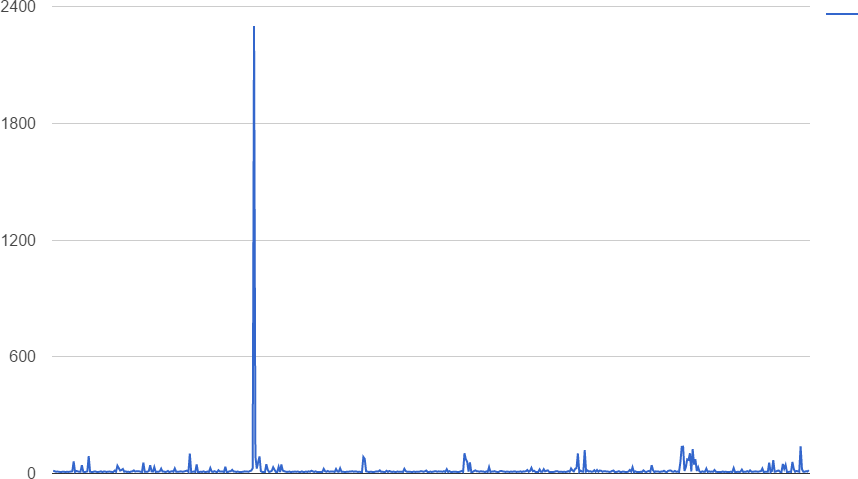Pierre Nakashian
Regular Contributor
i have RT-AC5300 running merlin 386.2_6, latency behavior is not new, just getting on my nerves i guess.
the router ac5300 is behind att NVG599 modem 1GB plan.
ping from NVG599 to amazon gives me
--------------------------------------------
PING www.amazon.com (13.249.56.40): 56 data bytes
64 bytes from 13.249.56.40: seq=0 ttl=244 time=11.914 ms
64 bytes from 13.249.56.40: seq=1 ttl=244 time=11.265 ms
64 bytes from 13.249.56.40: seq=2 ttl=244 time=11.300 ms
64 bytes from 13.249.56.40: seq=3 ttl=244 time=11.278 ms
--- www.amazon.com ping statistics ---
4 packets transmitted, 4 packets received, 0% packet loss
round-trip min/avg/max = 11.265/11.439/11.914 ms
ping from inside RT-AC5300 via ssh gives me
--------------------------------------------
ping -c 4 www.amazon.com
PING www.amazon.com (54.230.30.152): 56 data bytes
64 bytes from 54.230.30.152: seq=0 ttl=231 time=24.347 ms
64 bytes from 54.230.30.152: seq=1 ttl=231 time=24.026 ms
64 bytes from 54.230.30.152: seq=2 ttl=231 time=25.967 ms
64 bytes from 54.230.30.152: seq=3 ttl=231 time=23.937 ms
--- www.amazon.com ping statistics ---
4 packets transmitted, 4 packets received, 0% packet loss
round-trip min/avg/max = 23.937/24.569/25.967 ms
a sudden extra 13ms latency
traceroute from NVG599 gives me
--------------------------------------
traceroute to www.amazon.com (13.249.56.40), 30 hops max, 38 byte packets
1 99-67-236-1.lightspeed.austtx.sbcglobal.net (99.67.236.1) 1.539 ms 1.082 ms 1.172 ms
2 71.149.77.250 (71.149.77.250) 2.790 ms 2.921 ms 3.270 ms
3 12.240.220.238 (12.240.220.238) 12.103 ms 13.247 ms 11.138 ms
4 dlstx21crs.ip.att.net (12.122.1.209) 13.325 ms 13.315 ms 17.635 ms
5 12.122.2.198 (12.122.2.198) 15.593 ms 16.666 ms 18.304 ms
6 12.123.212.177 (12.123.212.177) 10.789 ms 10.183 ms 10.433 ms
7 32.140.105.242 (32.140.105.242) 11.559 ms 17.269 ms 12.154 ms
8 *
traceroute with -I from inside RT-AC5300 gives me
--------------------------------------------------------
traceroute to www.amazon.com (13.32.230.20), 30 hops max, 38 byte packets
1 192.168.1.254 (192.168.1.254) 0.617 ms 0.401 ms 0.345 ms
2 99-67-236-1.lightspeed.austtx.sbcglobal.net (99.67.236.1) 1.768 ms 1.669 ms 1.657 ms
3 71.149.77.250 (71.149.77.250) 3.223 ms 3.850 ms 3.971 ms
4 12.240.220.238 (12.240.220.238) 27.612 ms 29.447 ms 31.912 ms
5 attga21crs.ip.att.net (12.122.2.109) 28.141 ms 28.638 ms 31.941 ms
6 gbr8.attga.ip.att.net (12.122.96.101) 26.800 ms 26.972 ms 26.446 ms
7 12.244.0.26 (12.244.0.26) 23.240 ms 23.283 ms 23.181 ms
8 *
from the traceroute it seems the issue is not between RT-AC5300 and NVG599
the extra latency seems to be happening upstream at 12.240.220.238 IP along the hops
RT-AC5300 is configured with IP passthrough mode in the NVG599 modem, closest thing to bridge mode.
I know traffic from my router will have public IP address, traffic from NVG599 not sure but they could be traversing upstream with ip 192.168.1.254 instead
as far as I know, since i have no SSH access inside the NVG599.
i stopped using the ATT DNS, i noticed it was having packet loss, a month ago, also packet loss with cloudflare DNS IP,
but no packet loss with google dns, or quad 9 dns.
last night ping to ATT DNS IP every 4 pings ping latency would double up, I rebooted my router and the ping latency start behaving better again.
i have the RT-AC5300 normally scheduled for reboot once a week, so it had been only 2 days since it had been up.
I know my router is overworked, i have alot of LAN devices around 96 leases, i'm upgrading the router shortly, i've also run some dslreport.com speed test with my computer
directly connected to RT-AC5300, i get around 700mbs for the 1GB plan with buffer bloat. I can't use QOS at my speed, even if i replace my router with RT-AX88U i hear
consumer router cpu isn't fast enought for 1Gbit plans.
I've played with -> ifconfig eth0 txqueuelen 20000 it seems to help a little, it doesn't make ping response time completely consistent, and it doesn't eliminate
bufferbloat completely but it improves it enough not to get C/D anymore.
is my issue my ISP doing something different when traffic is from my public IP address versus, traffic from NVG599
with private address 192.168.1.0/24?
or is my issue too many LAN devices for my router RT-AC5300?
or is there a firewall rule my router has that can affect latency behavior upstream, even though my ping test had no packet loss?
I have turned off all firewall rules on the NVG599 modem.
Thanks
the router ac5300 is behind att NVG599 modem 1GB plan.
ping from NVG599 to amazon gives me
--------------------------------------------
PING www.amazon.com (13.249.56.40): 56 data bytes
64 bytes from 13.249.56.40: seq=0 ttl=244 time=11.914 ms
64 bytes from 13.249.56.40: seq=1 ttl=244 time=11.265 ms
64 bytes from 13.249.56.40: seq=2 ttl=244 time=11.300 ms
64 bytes from 13.249.56.40: seq=3 ttl=244 time=11.278 ms
--- www.amazon.com ping statistics ---
4 packets transmitted, 4 packets received, 0% packet loss
round-trip min/avg/max = 11.265/11.439/11.914 ms
ping from inside RT-AC5300 via ssh gives me
--------------------------------------------
ping -c 4 www.amazon.com
PING www.amazon.com (54.230.30.152): 56 data bytes
64 bytes from 54.230.30.152: seq=0 ttl=231 time=24.347 ms
64 bytes from 54.230.30.152: seq=1 ttl=231 time=24.026 ms
64 bytes from 54.230.30.152: seq=2 ttl=231 time=25.967 ms
64 bytes from 54.230.30.152: seq=3 ttl=231 time=23.937 ms
--- www.amazon.com ping statistics ---
4 packets transmitted, 4 packets received, 0% packet loss
round-trip min/avg/max = 23.937/24.569/25.967 ms
a sudden extra 13ms latency
traceroute from NVG599 gives me
--------------------------------------
traceroute to www.amazon.com (13.249.56.40), 30 hops max, 38 byte packets
1 99-67-236-1.lightspeed.austtx.sbcglobal.net (99.67.236.1) 1.539 ms 1.082 ms 1.172 ms
2 71.149.77.250 (71.149.77.250) 2.790 ms 2.921 ms 3.270 ms
3 12.240.220.238 (12.240.220.238) 12.103 ms 13.247 ms 11.138 ms
4 dlstx21crs.ip.att.net (12.122.1.209) 13.325 ms 13.315 ms 17.635 ms
5 12.122.2.198 (12.122.2.198) 15.593 ms 16.666 ms 18.304 ms
6 12.123.212.177 (12.123.212.177) 10.789 ms 10.183 ms 10.433 ms
7 32.140.105.242 (32.140.105.242) 11.559 ms 17.269 ms 12.154 ms
8 *
traceroute with -I from inside RT-AC5300 gives me
--------------------------------------------------------
traceroute to www.amazon.com (13.32.230.20), 30 hops max, 38 byte packets
1 192.168.1.254 (192.168.1.254) 0.617 ms 0.401 ms 0.345 ms
2 99-67-236-1.lightspeed.austtx.sbcglobal.net (99.67.236.1) 1.768 ms 1.669 ms 1.657 ms
3 71.149.77.250 (71.149.77.250) 3.223 ms 3.850 ms 3.971 ms
4 12.240.220.238 (12.240.220.238) 27.612 ms 29.447 ms 31.912 ms
5 attga21crs.ip.att.net (12.122.2.109) 28.141 ms 28.638 ms 31.941 ms
6 gbr8.attga.ip.att.net (12.122.96.101) 26.800 ms 26.972 ms 26.446 ms
7 12.244.0.26 (12.244.0.26) 23.240 ms 23.283 ms 23.181 ms
8 *
from the traceroute it seems the issue is not between RT-AC5300 and NVG599
the extra latency seems to be happening upstream at 12.240.220.238 IP along the hops
RT-AC5300 is configured with IP passthrough mode in the NVG599 modem, closest thing to bridge mode.
I know traffic from my router will have public IP address, traffic from NVG599 not sure but they could be traversing upstream with ip 192.168.1.254 instead
as far as I know, since i have no SSH access inside the NVG599.
i stopped using the ATT DNS, i noticed it was having packet loss, a month ago, also packet loss with cloudflare DNS IP,
but no packet loss with google dns, or quad 9 dns.
last night ping to ATT DNS IP every 4 pings ping latency would double up, I rebooted my router and the ping latency start behaving better again.
i have the RT-AC5300 normally scheduled for reboot once a week, so it had been only 2 days since it had been up.
I know my router is overworked, i have alot of LAN devices around 96 leases, i'm upgrading the router shortly, i've also run some dslreport.com speed test with my computer
directly connected to RT-AC5300, i get around 700mbs for the 1GB plan with buffer bloat. I can't use QOS at my speed, even if i replace my router with RT-AX88U i hear
consumer router cpu isn't fast enought for 1Gbit plans.
I've played with -> ifconfig eth0 txqueuelen 20000 it seems to help a little, it doesn't make ping response time completely consistent, and it doesn't eliminate
bufferbloat completely but it improves it enough not to get C/D anymore.
is my issue my ISP doing something different when traffic is from my public IP address versus, traffic from NVG599
with private address 192.168.1.0/24?
or is my issue too many LAN devices for my router RT-AC5300?
or is there a firewall rule my router has that can affect latency behavior upstream, even though my ping test had no packet loss?
I have turned off all firewall rules on the NVG599 modem.
Thanks



